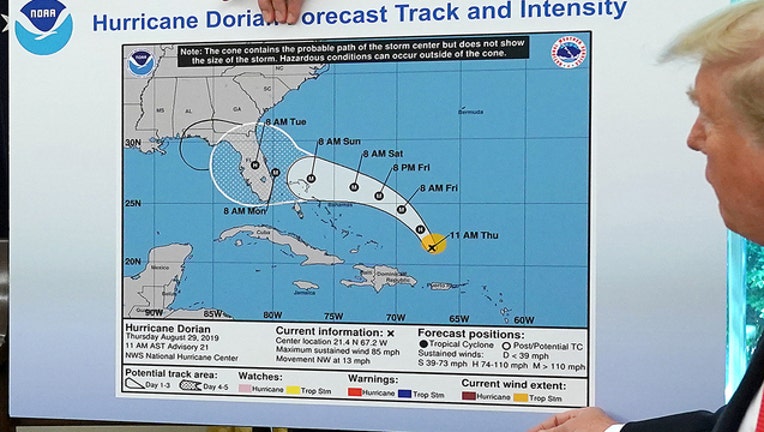Agency reverses course on Trump's Alabama hurricane claim

President Donald Trump references a map while talking to reporters following a briefing from officials about Hurricane Dorian in the Oval Office at the White House September 04, 2019. (Photo by Chip Somodevilla/Getty Images)
WASHINGTON (AP) - A federal agency reversed course Friday on the question of whether President Donald Trump tweeted stale information about Hurricane Dorian potentially hitting Alabama, upsetting meteorologists around the country.
On Sunday, Trump had warned that Alabama, along with the Carolinas and Georgia, was "most likely to be hit (much) harder than anticipated."
The National Weather Service in Birmingham, Alabama, tweeted in response: "Alabama will NOT see any impacts from #Dorian. We repeat, no impacts from Hurricane #Dorian will be felt across Alabama. The system will remain too far east."
But the president has been adamant throughout the week that he was correct, and the White House has deployed government resources and staff to back him.
The latest defense came out Friday evening, when the National Oceanic and Atmospheric Administration issued a statement from an unidentified spokesman stating that information provided by NOAA and the National Hurricane Center to the president had demonstrated that "tropical-storm-force winds from Hurricane Dorian could impact Alabama." The advisories were dated from last Wednesday, Aug. 28, through Monday, the statement read.
Friday's statement also said the Birmingham NWS tweet Sunday morning "spoke in absolute terms that were inconsistent with probabilities from the best forecast products available at the time."
The statement from NOAA contrasts with comments the agency's spokesman, Chris Vaccaro, made Sunday. "The current forecast path of Dorian does not include Alabama," Vaccaro said at the time.
Friday's NOAA statement, attributed to an unnamed spokesman and released just before 5 p.m. Friday, points to a few graphics issued by the National Hurricane Center to support Trump's claims. The maps show percentage possibility of tropical storm force winds in the United States. Parts of Alabama were covered, usually with 5% to 10% chances, between Aug. 27 and Sept. 3. Maps on Aug. 30 grew to cover far more of Alabama, but for only 12 hours, and the highest percentage hit 20% to 30% before quickly shrinking back down.
Alabama was not mentioned in any of the 75 forecast advisories the hurricane center sent out between Aug. 27 and Sept. 2. Nor was any Alabama city mentioned in the charts that listed percentage chances of tropical storm force winds or hurricane force winds. Every state along the U.S. East Coast - as well as Canada and inland places like Washington, D.C. - was mentioned in those charts, but not Alabama.
Some meteorologists voiced concerns about NOAA's actions Friday.
"I am very disappointed to see this statement come out from NOAA," Oklahoma University meteorology professor Jason Furtado told The Associated Press. "I am thankful for the folks at NWS Birmingham for their work in keeping the citizens of Alabama informed and up to date on weather hazards."
Furtado said NOAA's statement and the president's Twitter "war on weather" are undermining confidence in meteorologists, adding, "The job just got harder because of this issue."
University of Georgia meteorology professor Marshall Shepherd, former president of the American Meteorology Society, simply responded, "OMG."
Brian McNoldy, a hurricane researcher at the University of Miami, cited the focus that NOAA placed on "tropical force winds" in its Friday evening statement. He said the first assertion about such winds from Dorian affecting Alabama is fine, but the second assertion "seems to be excessive."
McNoldy said the National Weather Service "had the right tone and message for the time. Alabama, for some time, was on the fringe of probabilities of experiencing tropical storm winds. That is not very threatening."
"The Birmingham office was correct," said a NOAA staffer familiar with the situation but speaking on the condition of anonymity for fear of being fired in reprisal.
MIT meteorology professor Kerry Emanuel said Trump's "broadcast of false information is inexcusable."
NOAA's mission is to understand and predict changes in the Earth's environment. It is part of the Commerce Department, overseen by Secretary Wilbur Ross. The White House did not immediately respond to a question of whether someone at the White House had asked NOAA to issue its statement.
___
Associated Press writer Hope Yen contributed to this report.

